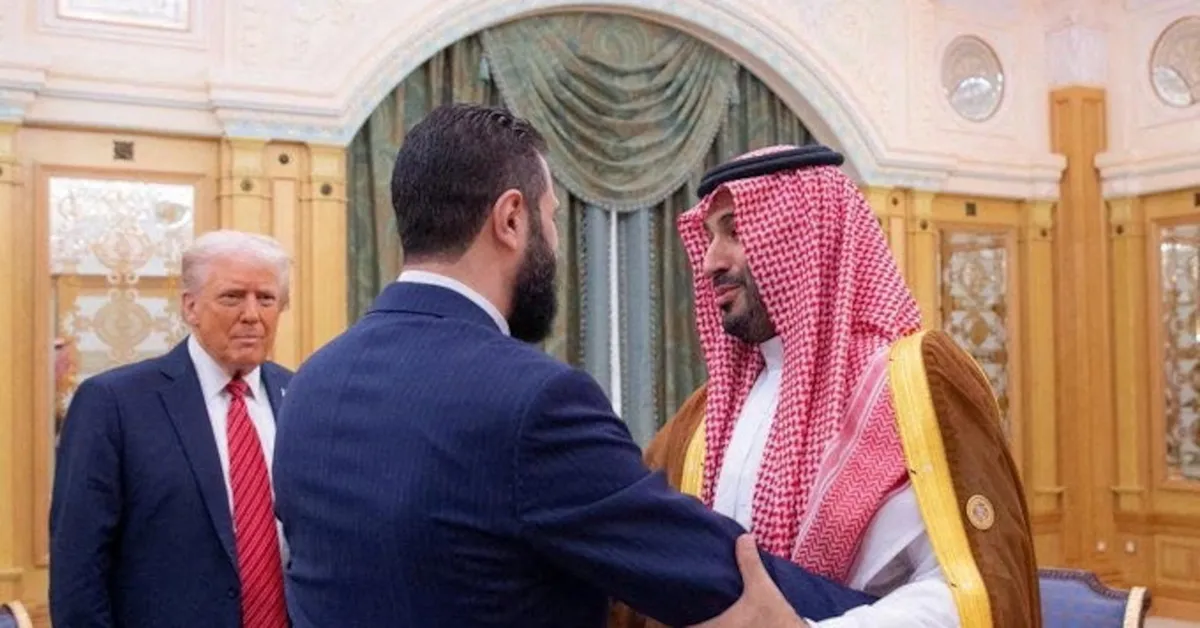
On May 18, 2023, a significant moment unfolded in Middle Eastern politics, highlighting Israeli Prime Minister Benjamin Netanyahu's increasing isolation. This was vividly exemplified by the image of U.S. President Donald Trump shaking hands with Syria's Islamist leader Ahmed al-Sharaa, whom Israel has labeled an al-Qaeda terrorist. Following their meeting in Riyadh, Trump praised Sharaa, stating, "He's got the potential. He's a real leader," signalling a major shift in regional alliances.
Trump's whirlwind four-day diplomatic tour through Saudi Arabia, Qatar, and the United Arab Emirates was more than a mere spectacle; it marked the establishment of a new Sunni-led order in the Middle East. This order effectively sidelines Israel and diminishes Iran's influence, according to sources from both the region and the West. Amidst growing frustration in Washington over Israel's hesitance to pursue a ceasefire in Gaza, the tour was perceived as a direct snub to Netanyahu, who had previously enjoyed unwavering U.S. support.
David Schenker, a former U.S. Assistant Secretary of State for Near Eastern Affairs, remarked, "This administration is very frustrated with Netanyahu... They're very, very transactional, and Netanyahu isn't giving them anything right now." While the U.S. is not abandoning Israel, it is clear that Trump's administration is prioritizing American interests in the Middle East over unconditional support for Netanyahu's right-wing agenda.
Sources reveal that U.S.-Israel relations have been strained, primarily due to Netanyahu's refusal to consider a ceasefire in Gaza and his opposition to U.S.-Iran nuclear negotiations. The Israeli Prime Minister's office has not commented publicly on Trump's tour, which has raised eyebrows among political analysts. A spokesperson for the White House's National Security Council reaffirmed the strong relationship with Israel, stating, "We continue to work closely with our ally Israel to ensure remaining hostages in Gaza are freed."
However, behind closed doors, U.S. officials have expressed irritation over Netanyahu's inability to align with Washington's positions, particularly regarding Gaza and Iran. As tensions escalated, Netanyahu was taken aback during a visit to Washington in April, where he sought military backing against Iran, only to learn that Trump was pursuing diplomatic solutions instead.
The ongoing war in Gaza has further complicated matters. Following Hamas' attack on October 7, 2023, which resulted in approximately 1,200 Israeli deaths, the conflict has escalated dramatically. Local health officials report that the death toll in Gaza has exceeded 52,900, sparking international outrage over the humanitarian crisis. Despite calls for a ceasefire, Netanyahu has intensified military operations, leaving many to question his strategy and the future of peace in the region.
As Trump concluded his visit, Israel launched a new offensive in Gaza, resulting in the deaths of hundreds of Palestinians. The situation has also hindered Trump's efforts to expand the Abraham Accords by normalizing relations between Israel and Saudi Arabia. Riyadh has made it clear that it will not establish ties with Israel until the war ends and a pathway to Palestinian statehood is established, which Netanyahu opposes.
Publicly, Trump has downplayed any rift with Netanyahu, asserting that he understands the complexities of the situation. However, his actions indicate a strategic pivot towards strengthening ties with wealthy Sunni states, particularly Saudi Arabia. A senior regional source noted that Trump's visit solidified Saudi Arabia's role as the leader of the Sunni Arab world, diminishing Iran's influence in the region.
In Qatar, Trump was welcomed with royal fanfare, and amidst lavish ceremonies, he acknowledged Qatar's efforts in the Israeli hostage crisis, despite its financial support for Hamas. This has drawn criticism from Israeli officials who view Qatar as a strategic threat. Nonetheless, Qatar's wealth and diplomatic influence have made it an indispensable ally for the U.S.
Trump's tour is estimated to have secured over $2 trillion in investment commitments for the U.S. economy, with significant defense deals including a record $142 billion arms deal with Saudi Arabia. This deal has raised concerns in Israel about losing air superiority in the region, particularly if Riyadh gains access to advanced military technology such as Lockheed's F-35 jets.
The evolving U.S.-Saudi relationship has also seen Trump offer Riyadh flexibility in establishing relations with Israel, emphasizing that they can proceed on their own timeline. Furthermore, Trump's decision to lift sanctions against Syria, driven by Saudi interests, represents a notable shift in U.S. policy that has raised alarms in Israel.
As the Middle East undergoes significant transformations, Netanyahu's government faces mounting pressure. Critics within Israel have expressed concerns that the country is becoming increasingly sidelined, with former Prime Minister Naftali Bennett condemning Netanyahu's administration as "paralyzed." The changing dynamics in U.S. foreign policy and regional alliances suggest that Israel's role in the Middle East may be evolving, leaving many to wonder about the future of peace and stability in the region.